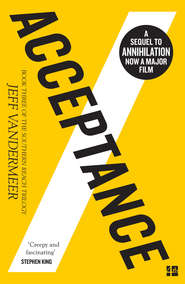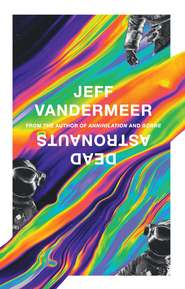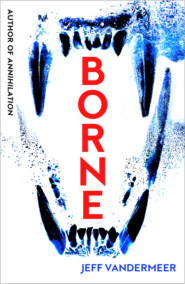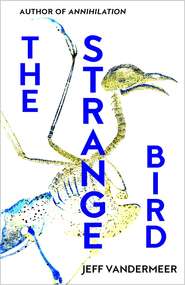По всем вопросам обращайтесь на: info@litportal.ru
(©) 2003-2024.
✖
Authority
Настройки чтения
Размер шрифта
Высота строк
Поля
Control had immediately taken a seat behind the battering ram of a desk, among the clutter of piles and piles of folders, the ramble of handwritten notes and Post-its … in the swivel chair that gave him such a great panoramic view of the bookcases against the walls, interspersed with bulletin boards overlaid with the sediment of various bits of paper pinned and re-pinned until they looked more like oddly delicate yet haphazard art installations. The room smelled stale, with a slight aftertaste of long-ago cigarettes.
Just the size and weight of the director’s computer monitor spoke to its obsolescence, as did the fact that it had died decades ago, thick dust layered atop it. It had been halfheartedly shoved to the side, two shroud-shadows on the calendar blotter beneath describing both its original location and the location of the laptop that had apparently supplanted it—although no one could now find that laptop. He made a mental note to ask if they had searched her home.
The calendar dated back to the late nineties; was that when the director had started to lose the thread? He had a sudden vision of her in Area X with the twelfth expedition, just wandering through the wilderness with no real destination: a tall, husky, forty-year-old woman who looked older. Silent, conflicted, torn. So devoured by her responsibility that she’d allowed herself to believe she owed it to the people she sent into the field to join them. Why had no one stopped her? Had no one cared about her? Had she made a convincing case? The Voice hadn’t said. The maddeningly incomplete files on her told Control nothing.
Everything in what he saw showed that she had cared, and yet that she had cared not at all about the functioning of the agency.
Nudging his knee on the left, under the desk: the hard drive for the monitor. He wondered if that had stopped working back in the nineties, too. Control had the feeling he did not want to see the rooms the hardware techs worked in, the miserable languishing corpses of the computers of past decades, the chaotic unintentional museum of plastic and wires and circuit boards. Or perhaps the fish did rot from the head, and only the director had decomposed.
So, sans computer, his own laptop not yet deemed secure enough, Control had done a little light reading of the transcripts from the induction interviews with the members of the twelfth expedition. The former director, in her role as psychologist, had conducted them.
The other recruits had been uncappable, unstoppable geysers in Control’s opinion: Great chortling, hurtling, cliché-spouting babblers. People who by comparison could not hold their tongues … 4,623 words … 7,154 words … and the all-time champion, the linguist who had backed out at the last second, coming in at 12,743 words of replies, including a heroically prolonged childhood memory “about as entertaining as a kidney stone exploding through your dick,” as someone had scrawled in the margin. Which left just the biologist and her terse 753 words. That kind of self-control had made him look not just at the words but at the pauses between them. For example: “I enjoyed all of my jobs in the field.” Yet she had been fired from most of them. She thought she had said nothing, but every word—even breakfast—created an opening. Breakfast had not gone well for the biologist as a child.
The ghost was right there, in the transcripts since her return, moving through the text. Things that showed themselves in the empty spaces, making Control unwilling to say her words aloud for fear that somehow he did not really understand the undercurrents and hidden references. A detached description of a thistle … A mention of a lighthouse. A sentence or two describing the quality of the light on the marshes in Area X. None of it should have gotten to him, yet he felt her there, somehow, looking over his shoulder in a way not evoked by the interviews with the other expedition members.
The biologist claimed to remember as little as the others.
Control knew that for a lie—or it would become a lie if he drew her out. Did he want to draw her out? Was she cautious because something had happened in Area X or because she was just built that way? A shadow had passed over the director’s desk then. He’d been here before, or somewhere close, making these kinds of decisions before, and it had almost broken him, or broken through him. But he had no choice.
About seven hundred words after she came back. Just like the other two. But unlike them, that was roughly comparable to her terseness before she had left. And there were the odd specifics that the others lacked. Whereas the anthropologist might say “The wilderness was empty and pristine,” the biologist said, “There were bright pink thistles everywhere, even when the fresh water shifted to saline … The light at dusk was a low blaze, a brightness.”
That, combined with the strangeness of the empty lot, made Control believe that the biologist might actually remember more than the others. That she might be more present than the others but was hiding it for some reason. He’d never had this particular situation before, but he remembered a colleague’s questioning of a terrorist who had suffered a head wound and spent the interrogation sessions in the hospital delaying and delaying in hopes his memory would return. It had. But only the facts, not the righteous impulse that had engendered his action, and then he’d been lost, easy prey for the questioners.
Control hadn’t shared his theory with the assistant director because if he was wrong she’d use it to shore up her negative opinion of him—but also to keep her off-balance for as long as possible. “Never do something for just one reason,” his grandpa had told him more than once, and that, at least, Control had taken to heart.
The biologist’s hair had been long and dark brown, almost black, before they’d shaved it off. She had dark, thick eyebrows, green eyes, a slight, slightly off-center nose (broken once, falling on rocks), and high cheekbones that spoke to the strong Asian heritage on one side of her family. Her chapped lips were surprisingly full for such a thin frown. He mistrusted the eyes, the percentages on that, had checked to confirm they hadn’t been another color before the expedition.
Even sitting down at the table, she somehow projected a sense of being physically strong, with a ridge of thick muscle where her neck met her shoulders. So far, all the tests run had come back negative for cancer or other abnormalities. He couldn’t remember what it said in her file, but Control thought she was probably almost as tall as him. She had been held in the eastern wing of the building for two weeks now, with nothing to do but eat and exercise.
Before going on the expedition, the biologist had received intense survival and weapons training at a Central facility devoted to that purpose. She would have been briefed with whatever half-truths the Southern Reach’s command and control deemed useful, based on criteria Control still found arcane, even murky. She would have been subjected to conditioning to make her more receptive to hypnotic suggestion.
The psychologist/director would have been given any number of hypnotic cues to use—words that, in certain combinations, would induce certain effects. Passing thought as the door shut behind Control: Had the director had anything to do with muddying their memories, while they were still in Area X?
Control slid into a chair across from the biologist, aware that Grace, at the very least, watched them through the one-way glass. Experts had questioned the biologist, but Control was also a kind of expert, and he needed to have the direct contact. There was something in the texture of a face-to-face interview that transcripts and videotape lacked.
The floor beneath his shoes was grimy, almost sticky. The fluorescent lights above flickered at irregular intervals, and the table and chairs seemed like something out of a high-school cafeteria. He could smell the sour metallic tang of a low-quality cleaning agent, almost like rotting honey. The room did not inspire confidence in the Southern Reach. A room meant as a debriefing space—or meant to seem like a debriefing space—should be more comfortable than one meant always and forever for interrogation, for a presumption of possible resistance.
Now that Control sat across from the biologist, she had the kind of presence that made him reluctant to stare into her eyes. But he always felt nervous right before he questioned someone, always felt as if that bright flash of light across the sky had frozen in its progress and come down to stand at his shoulder, mother in the flesh, observing him. The truth of it was, his mother did check up on him sometimes. She could get hold of the footage. So it wasn’t paranoia or just a feeling. It was part of his possible reality.
Sometimes it helped to play up his nervousness, to make the person across from him relax. So he cleared his throat, took a hesitant sip of water from the glass he’d brought in with him, fiddled with the file on her he’d placed on the table between them, along with a remote control for the TV to his left. To preserve the conditions under which she’d been found, to basically ensure she didn’t gain memories artificially, the assistant director had ordered that she not be given any of the information from her personnel file. Control found this cruel but agreed with Grace. He wanted the file between them to seem like a possible reward during some later session, even if he didn’t yet know if he would give it to her.
Control introduced himself by his real name, informed her that their “interview” was being recorded, and asked her to state her name for the record.
“Call me Ghost Bird,” she said. Was there a twinge of defiance in her flat voice?
He looked up at her, and instantly was at sea, looked away again. Was she using hypnotic suggestion on him somehow? It was his first thought, quickly dismissed.
“Ghost Bird?”
“Or nothing at all.”
He nodded, knew when to let something go, would research the term later. Vaguely remembered something in the file. Perhaps.
“Ghost Bird,” he said, testing it out. The words tasted chalky, unnatural in his mouth. “You remember nothing about the expedition?”
“I told the others. It was a pristine wilderness.” He thought he detected a note of irony in her tone, but couldn’t be sure.
“How well did you get to know the linguist—during training?” he asked.
“Not well. She was very vocal. She wouldn’t shut up. She was …” The biologist trailed off as Control stifled elation. A question she hadn’t expected. Not at all.
“She was what?” he prompted. The prior interrogator had used the standard technique: develop rapport, present the facts, grow the relationship from there. With nothing really to show for it.
“I don’t remember.”
“I think you do remember.” And if you remember that, then …
“No.”
He made a show of opening the file and consulting the existing transcripts, letting the edge of the paper-clipped pages that gave her most vital statistics come clear.
“Okay, then. Tell me about the thistles.”
“The thistles?” Her expressive eyebrows told him what she thought of the question.
“Yes. You were quite specific about the thistles. Why?” It still perplexed him, the amount of detail there about thistles, in an interview from the prior week, when she’d arrived at the Southern Reach. It made him think again of hypnotic cues. It made him think of words being used as a protective thicket.
The biologist shrugged. “I don’t know.”
He read from the transcript: “‘The thistles there have a lavender bloom and grow in the transitional space between the forest and the swamp. You cannot avoid them. They attract a variety of insects and the buzzing and the brightness that surrounds them suffuses Area X with a sense of industry, almost like a human city.’ And it goes on, although I won’t.”
She shrugged again.
Control didn’t intend to hover, this first time, but instead to glide over the terrain, to map out the extent of the territory he wanted to cover with her. So he moved on.
“What do you remember about your husband?”
“How is that relevant?”
“Relevant to what?” Pouncing.
No response, so he prompted her again: “What do you remember about your husband?”
“That I had one. Some memories before I went over, like I had about the linguist.” Clever, to tie that in, to try to make it seem part and parcel. A vagueness, not a sharpness.
“Did you know that he came back, like you?” he asked. “That he was disoriented, like you?”
“I’m not disoriented,” she snapped, leaning forward, and Control leaned back. He wasn’t afraid, but for a moment he’d thought he should be. Brain scans had been normal. All measures had been taken to check for anything remotely like an invasive species. Or “an intruder” as Grace put it, still unable to say anything to him remotely like the word alien. If anything, Ghost Bird was healthier now than before she’d left; the toxins present in most people today existed in her and the others at much lower levels than normal.










